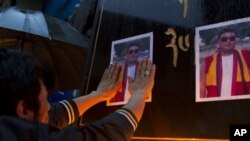- China says a court in Sichuan province has sentenced a senior Tibetan monk to 11 years in prison over the death of a fellow Buddhist monk who died in March after setting himself on fire in a protest at a monastery.
The official Xinhua news agency says the court in southwestern China convicted the monk, identified as Drongdru, of intentional homicide for hiding his injured colleague, a nephew, and preventing him from receiving medical treatment after the self-immolation. The Xinhua statement also said the defendant voiced regret for his role during the one-day trial, and said he declined his right to appeal.
The Xinhua report contradicts earlier claims by human rights groups that monks at the Kirti monastery rescued their dying colleague from police who had begun beating him after dousing the flames.
Two other monks charged in the death face trial Tuesday.
The two remaining defendants are accused of plotting, instigating and helping 16-year-old Rigzin Phuntsog prepare for his protest on March 16. Rights groups say the young monk set himself afire to protest Chinese policies toward Tibetan Buddhists.
The monastery has been under tight security since the March incident.
China admitted in June that local authorities had started conducting "legal education" of some 300 monks at the monastery because they had disobeyed Tibetan Buddhism rules and disrupted local order.
The U.S. State Department said at the time that China's actions were inconsistent with freedom of religion and human rights. China retorted that the United States should "respect facts" and stop making "irresponsible remarks."
Foreign journalists are rarely allowed to enter Tibetan areas, making it difficult to verify the claims of either the Tibetan exiles or the Chinese authorities.





